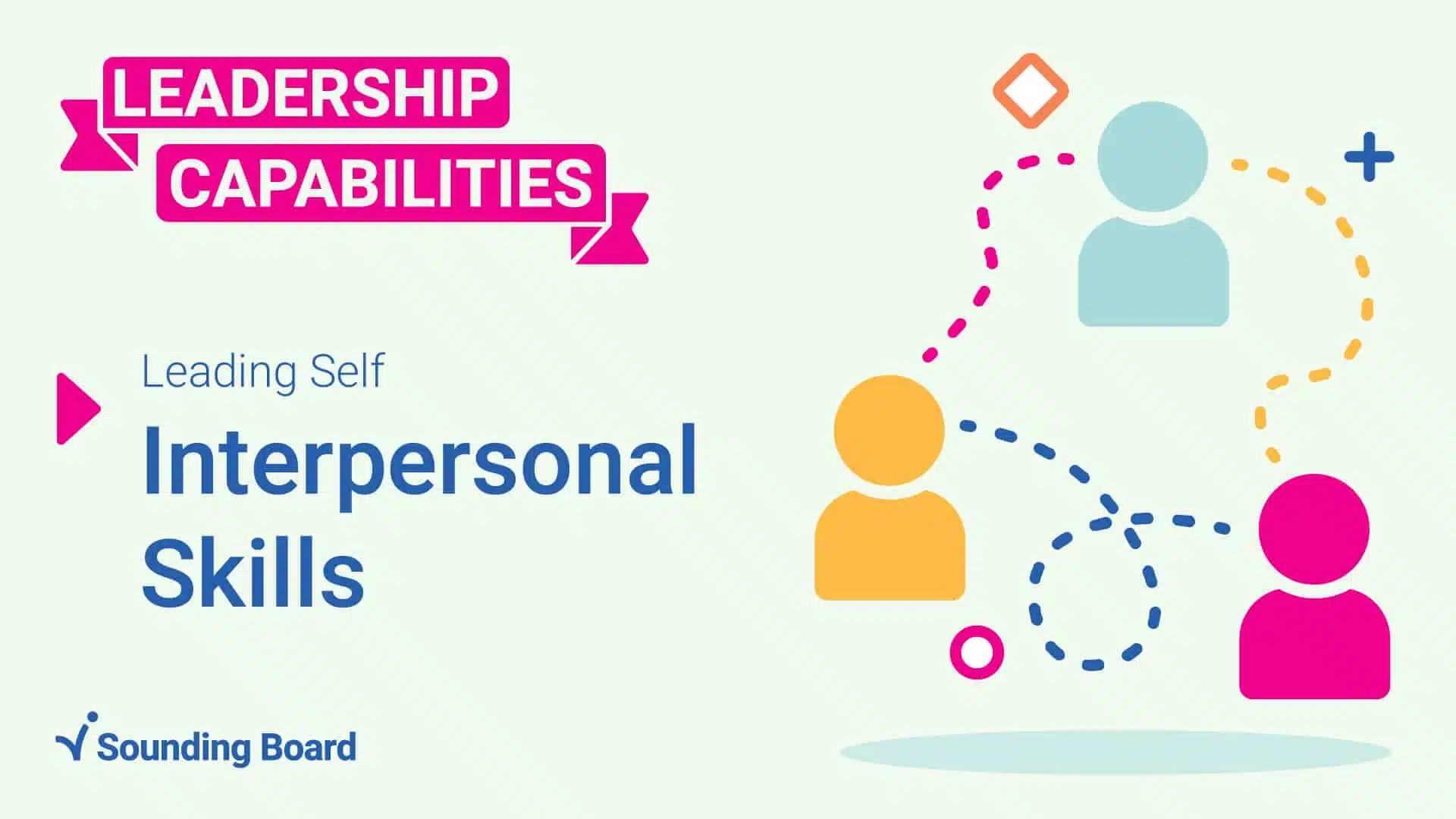This blog is part of a 16-part series focused on what capabilities make a strong leader. Sounding Board has identified 16 leadership capabilities that the strongest leaders possess. These were developed from research-backed leadership theories, leadership competencies used for evaluation from top business schools, and 25+ years of practical coaching application.
Being a leader in an organization can’t be done without connecting with other people – whether it’s clients, employees, vendors, managers, or fellow leaders. To successfully connect and communicate with these diverse groups, interpersonal skills are integral. They ensure that leaders are socially competent and can cultivate positive relationships.
So, what exactly are these interpersonal skills, and how do they help build strong leaders?
Interpersonal skills are capabilities we use to interact with others in the workplace. They form part of our emotional intelligence and encompass a range of behaviors, such as communication and active listening. Honing interpersonal skills is not only critical to a leader’s individual success, they promote team success, and success in the organization at large.
Why are interpersonal skills important in leadership?
There are numerous reasons why interpersonal skills are essential for a leader. These skills enable leaders to build a meaningful relationship with colleagues and employees, address poor performance, navigate setbacks, and motivate employees. Leaders who possess emotional intelligence, of which interpersonal skills are a key part, are more apt to build a motivated and productive workforce.
Typically, it’s easy to spot an emotionally intelligent leader. You can identify them by their desire to understand others’ intentions and desired outcomes, and their ability to express opinions and emotions authentically and respectfully. In addition to being empathetic, they also observe patterns of behavior in their team members, and use these observations to improve their relationships with them.
The characteristics of a leader with effective interpersonal skills
People skills are a prerequisite to build partnerships and a collaborative team environment. Here are some interpersonal skills leaders’ should hone:
Name intentions to help manage personal impact
Great leaders often demonstrate excellent communication skills. Although effective communication includes many elements, such as choosing clear language, active listening, and creating space for others to participate, one of the most important elements is the ability to name your own intentions.
Naming intentions is an essential piece of interpersonal skills because it clearly sets the stage for a conversation. Clear is kind. By providing the foundational intention for a conversation, a leader’s teammates, direct reports, and managers have context with which to orient themselves.
Seek to understand others’ intentions and desired outcomes
Just as sharing their own intentions within a conversation is important, leaders must make space to respect and hear out others’ intentions as well. Active listening is an extremely helpful interpersonal skill in this regard.
Active listening is listening with the goal to understand, not merely to reply. This type of listening calls for leaders to listen to what a speaker says, understand the message and motivation, and then respond carefully and thoughtfully. This leadership skill goes a long way to help build a rapport with others, and assure them that you care about what they say.
Express thoughts, opinions, and emotions authentically and respectfully
Leaders should be able to communicate authentically and respectfully, verbally and in writing. In fact, studies show that three out of four employees rate effective communication as the number one leadership attribute. However, only a third agree that their leaders communicate effectively.
It’s important to remember that communication is not only verbal. Non-verbal communication – facial expressions, hand gestures, and body language – are also part of effective communication, and they are equally relevant when it comes to a leader’s ability to convey a message effectively to an audience.
Consider others’ perspectives, and offer empathy and understanding
Empathy is the ability to put yourself in your team members’ shoes to better understand them and what motivates them. This interpersonal skill fosters a connection with team members and promotes an environment built on trust, mutual respect, and collaboration. Being an empathetic leader creates a reciprocal environment where team members are more likely to be engaged and productive.
Observe behavioral patterns, and use them to interact more successfully
A good leader encourages collaboration among employees by creating an environment where people communicate ideas freely, listen to each other, and resolve conflicts collaboratively. Successful interpersonal skills include the ability to notice behavior patterns within team members, and leverage those themes, interests, and dynamics to build a more streamlined and unified culture.
How to improve interpersonal skills in leadership
There are several ways leaders can improve their interpersonal skills. Leadership coaching is a great intervention to build these valuable skills and tie them to measurable business outcomes. But here are a few places to start today:
Be considerate, and show compassion
Practicing compassion helps to refine interpersonal skills because as a leader makes an effort to understand others’ emotions and experiences, they strengthen their relationships with them.
Show interest in others
Leaders can practice avoiding turning down people who want to open up or confide in them. Showing interest creates the perception of an individual who is always willing to offer a helping hand, which can be critical when building connections.
Don't complain
Rather than complain, leaders can listen carefully to others’ issues, and offer solutions where possible.
Learn to give credit
Cultivate gratitude, self-confidence, and acknowledgement by giving team mates credit where it is due. Celebrating others’ success does not detract from your own. It makes you seem like a trustworthy team player.
Start Now
Interpersonal skills are an essential capability in effective leadership. With these skills, leaders can better motivate their team, encourage collaboration, and foster stronger engagement, all of which ultimately contribute to an organization’s success.
Not sure where to start? The team at Sounding Board has you covered. Our network of certified coaches are highly trained in leadership development and can offer personalized solutions to help your business thrive. For more information, reach out to our team. We will help you understand the value of our specialized coaches for your organization, and help you get started today.











